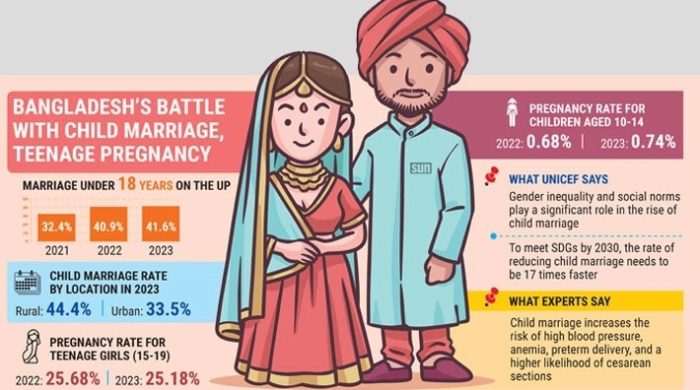Jasmin’s family members said the decision to marry her off at an early age was a big mistake.
Doctors said early marriage and its associated issues have significantly contributed to Jasmin’s current condition.


Jasmin’s family members said the decision to marry her off at an early age was a big mistake.
Doctors said early marriage and its associated issues have significantly contributed to Jasmin’s current condition.
While child marriage has cost Jasmin dearly, her childhood playmate Bithi has been a bit more fortunate. Although she did not develop mental health issues, Bithi also suffered from serious health problems after being married at the age of 13.
Despite progress in reducing child marriage and early pregnancy in recent years, many women and children like Jasmin and Bithi remain victims.
Child marriage, child pregnancy on the rise for three years
According to the MICS report, the child marriage rate in Bangladesh has decreased by 16% since 2011, an average of 2.1% per year. However, UNICEF states that the rate of reducing child marriage must be 17 times faster to meet the Sustainable Development Goals (SDGs) by 2030.
Besides, while the pregnancy rate among teenage girls (aged 15-19) slightly declined in 2023, the rate among children aged 10 to 14 increased. In 2023, the pregnancy rate for adolescent girls aged 15-19 was 25.18%, compared to 25.68% in 2022. Conversely, the pregnancy rate for children aged 10-14 years was 0.74% in 2023, up from 0.68% in 2022.
Md Alamgir Hossain, project director of SVRS and deputy director of BBS, informed the Daily Sun that child marriage is most prevalent in Chapainawabganj and Bogura in North Bengal as well as Satkhira, Jashore and Magura in Khulna division and Gopalganj in Dhaka division.
Health impacts of child marriage and pregnancy
According to doctors, child marriages and pregnancies not only have physical ramifications for girls but also profoundly affect their mental well-being.
Addressing the concerning trend of child marriage and pregnancy among girls aged 10 to 14, Dr Hussain said, “Young girls are neither physically nor mentally prepared for childbirth. Consequently, they face heightened risks of high blood pressure, anaemia, pre-term delivery and an increased likelihood of caesarean section.”
She stressed the importance of delaying childbirth until at least the age of 21 as it significantly enhances the health outcomes for both mother and child. Early pregnancy, she noted, often leads to strained mother-child relations.
Additionally, early pregnancy has detrimental effects on mental health.
Dr Ali from Pabna Mental Hospital, referring to cases like Jasmin’s, explained, “The sudden transition to adult responsibilities, coupled with child abuse and forced sexual relations, can lead to depression and anxiety. Over time, these individuals may develop severe mental illnesses.”
Why is child marriage increasing?
Jasmin’s family admits that the decision to marry her off at just 13 was wrong.
Her mother Rita said, “I married my little girl off due to financial strain. But it was a wrong decision. She couldn’t handle the pressure of a husband’s family and three children. Now her life is a mess.”
According to UNICEF, gender inequality and social norms play a significant role in the rise of child marriage and pregnancy. Additionally, poverty, lack of educational opportunities, low income, limited access to resources for girls and women, lack of their own income, financial planning skills and discriminatory laws based on gender and age contribute to the increase in the child marriage.
UNICEF reports that while child marriage has significantly decreased among affluent and educated girls, it remains high among underprivileged, uneducated and rural girls.
Statistics indicate that the poverty rate in the country has risen in recent years due to various national and international factors, including the COVID-19 pandemic.
Experts suggest noted that in recent years, the increase in child marriage is driven by both existing social reasons and the economic crisis.
SVRS project director Alamgir Hossain stated, “Social factors are more responsible than economic factors for child marriage.”
Sheldon Yate, UNICEF representative, told the Daily Sun, “Child marriage and child pregnancy have a profound negative impact on society and the development of Bangladesh. Child marriage hinders girls’ educational and economic opportunities, making them unable to contribute significantly to the labor market. Their role as active citizens is shrinking.”